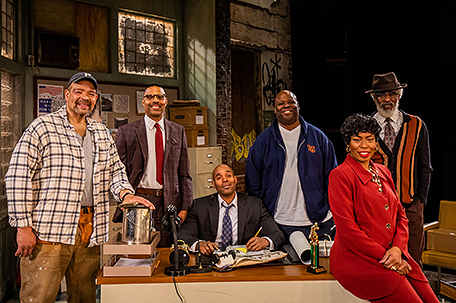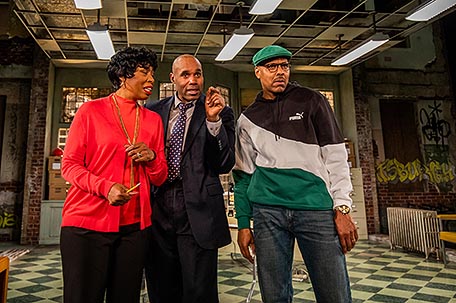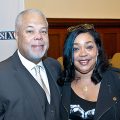
ABOVE PHOTO: The cast of August Wilson’s “Radio Golf” from left; Brian Anthony Wilson, Phillip Brown, Kesserack Kemnew, Kash Goins (director), Zuhairah, and Damien J. Wallace. (Photo: Ashley Smith/Wide Eyed Studios)
By Constance Garcia-Barrio
As irony would have it, the late playwright August Wilson didn’t begin valuing the rich Black language he had heard in childhood until he moved away from Pittsburgh’s Hill District where he grew up.
“In the Hill District, I was surrounded by all this highly charged, poetic vernacular which was so much part and parcel of life that I didn’t pay any attention to it,” writer Marlis C. McCollum quoted Wilson as saying in an article about his receiving a 1999 National Humanities Medal from National Endowment for the Humanities. “But in moving to St. Paul and suddenly being removed from that environment and that language, I began to hear it for the first time and recognize its value.”
Wilson and his five sisters and brothers were the children of a German American father and an African American mother from North Carolina. Raised largely by their mother, Daisy Wilson, Wilson and his siblings heard Black southern speech growing up.
Wilson’s play “Radio Golf” contains this delicious verbal broth of his youth. A new production of this pivotal work is currently onstage at the Arden Theatre, located at 40 N. 2nd Street in Old City.
“Radio Golf” is the last in a 10-play series collectively known as the Century Cycle or Pittsburgh Cycle, in which Wilson wrote one play chronicling each decade of Black life in the 1900s. Set in the Hill District in the 1990s, “Radio Golf” follows Harmond Wilks, played by Kesserack Kemnew, who seems poised to be elected Pittsburgh’s first Black mayor. Roosevelt Hicks, played by Phillip Brown, is Wilks’ business partner in a construction company. Wilks and Hicks are about to reap huge profits from the Bedford Hills Redevelopment Project. The project, in Wilks’ old Hill District neighborhood, will consist of two 10-story apartment buildings and high-end stores like Starbucks, Whole Foods, and a Barnes and Noble bookstore.
Hicks also promises to promote Wilks’ candidacy for mayor once he has bought an interest in a radio station. However, a problem arises when Wilks learns that one of the houses to be demolished for the project, 1839 Wylie Street, was illegally acquired. The owner, Elder Joseph Barlow, played by Damien Wallace, refuses to sell it to Wilks. Representatives of the posh stores threaten to walk away from the project because of the changes in plans the disputed house would require. Meanwhile, Hicks and Wilks’ wife, Mame, — played by Zuhairah — an attractive ambitious woman, pressure Wilks to let the house be demolished. To further complicate matters, Wilks learns that he’s a cousin of the home’s rightful owner.
Wilks has led an apparently easy life. He’s stepped into the real estate company his father established and followed the plans his father made for him. Wilks brings to mind “…the rise of a well-scrubbed Black middle-class” that Isabel Wilkerson wrote about in “The Warmth of Other Suns: The Epic Story of America’s Great Migration.”
“Anonymous teachers, store clerks …and physicians… were all products of the Great Migration,” Wilkerson wrote. It’s as if the playwright asks: ‘What do you have left when you shake loose the dirt from your roots?’

Wilks speaks of his twin brother, who defied their father’s plans for him, went to Vietnam, and was killed there. The question of whether Wilks has the courage to follow his own mind, as his twin did, and face the consequences, stands at the heart of the play.
Wilson’s script poses the dilemma in pitch-perfect speech. Wilks speaks in the bland polished tones that his Ivy League education has given him. But the juiciest lines belong to working-class characters like the shady Elder Joseph Barlow, played by Damien Wallace, and Sterling Johnson, a construction workman and former schoolmate of Wilks, played by Brian Anthony Wilson.
“Ain’t got to go to school to study up on what’s right and what’s wrong,” Johnson says when discussing the question of demolishing the house on Wylie Street with Wilks.
Golf symbolizes success for Hicks and Wilks. Wilks has golf clubs stolen from his car but later returned. He has a practice golf set-up in his office. Hicks, for his part, is signing up kids for a golf camp, and a golf lesson is broadcast on the radio at one point.
“I hit my first golf ball I asked myself, “Where have I been?’” Hicks says early in the play. “How’d I miss this?”
Later, in a ribald moment, he speaks of how a business triumph elated him.
“I felt like I was holding my [expletive] in my hand,” he says, with a golf club appropriately positioned.
Laughs set a brisk pace, but the actors imbue moments of reckoning, for example, when Wilks tells his wife what he’s decided, with great emotional power.
Wilson folded other issues into this fast-paced play, which runs two-and-a-half hours, including the intermission. For example, he alludes to Black soldiers who returned from World War II only to find themselves disrespected.
The set, which shows Wilks’ office in a blighted area, with a broken window and barred windows as well as graffiti, could have been lifted from one of Philly’s rundown neighborhoods.
The lighting heightens the tension. During one moment of crisis, it takes on a reddish tinge. At another point it shows two actors in profile with the rest of the set dark, suggesting looming trouble.
I had only one quibble. During the first act, Hicks’ voice seemed muffled when he spoke and turned away, but by the second act that no longer happened.
Before the play began, I button-holed people to ask why they’d come. Several of them said that they knew the actors were superb and wanted to see how they played off each other’s energy. I found their synergy a feast for both eye and ear. They had crackerjack timing and subtleties of intonation. Add to that August Wilson’s humor and 1990s Black street-corner idiom as he puts forward issues of race, class, and cash. It makes for an exciting evening.
“Radio Golf” will be at the Arden through April 16. Discounts for groups, seniors, educators, and the military are available. For more information, or to ask about the discount code, call: (215) 922-1122 or visit the Arden website at: https://ardentheatre.org/production/radio-golf/.















Leave a Comment